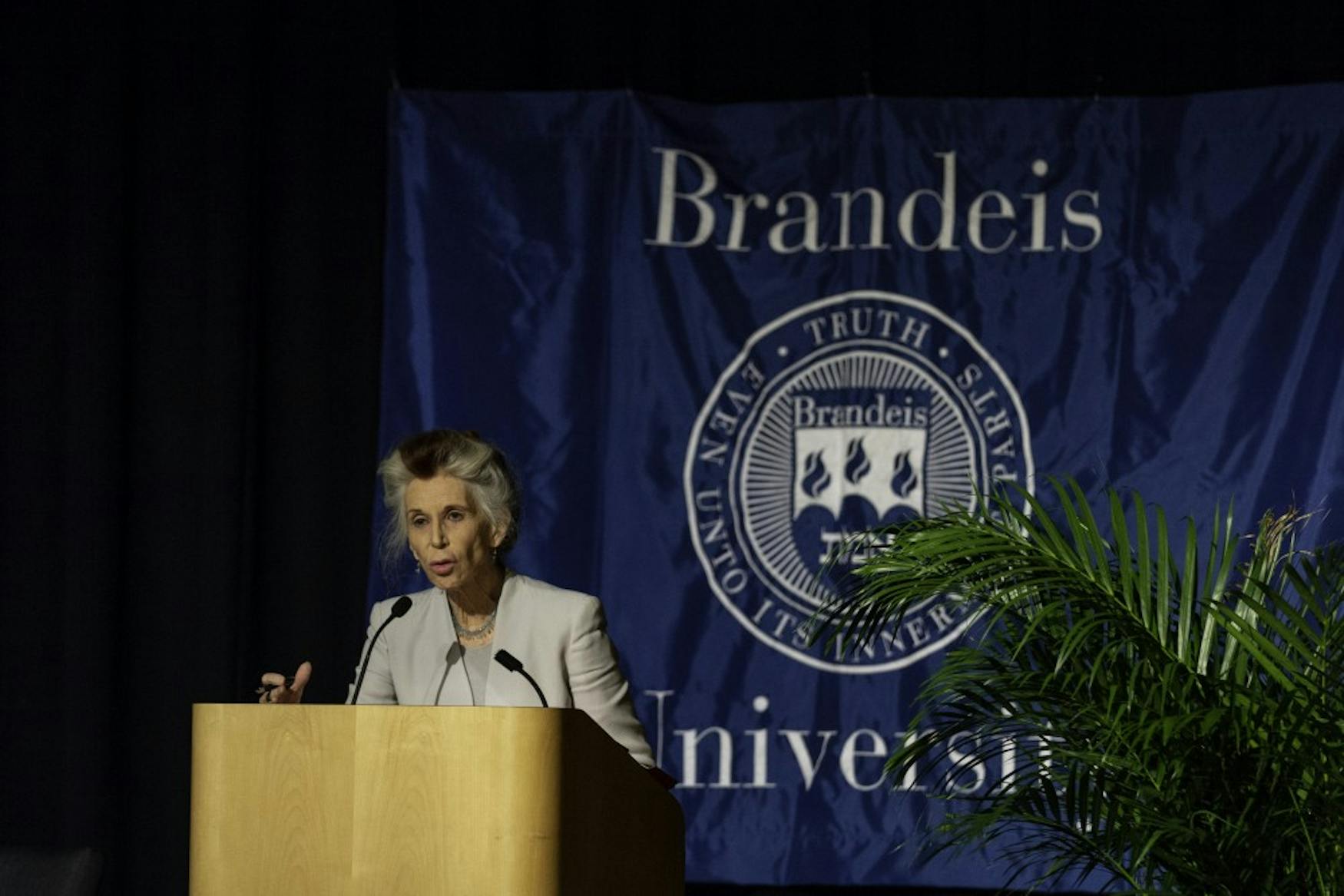Scholar examines impact of #MeToo movement
On the final day of the 2018 Family Weekend, parents and students gathered to hear Catherine A. MacKinnon speak about the movement to counter sexual harassment around the country. MacKinnon, currently an Elizabeth A. Long professor of Law at the University of Michigan and a 2018-19 James Barr Ames Visiting Professor of Law at Harvard Law School, spoke on the topic of “Sexual Harassment: The Law, The Politics, and The Movement” for the 10th Annual Diane Markowicz Memorial Lecture on Gender and Human Rights sponsored by the Hadassah-Brandeis Institute.
MacKinnon began by explaining that “we are in the midst of the world’s first mass movement against sexual abuse,” referencing the emergence of the transnational #MeToo movement. According to her, this movement was founded by Tarana Burke in 2006 to help survivors of sexual violence from low-income communities find ways of healing. The movement, MacKinnon explains, exposes sexual harassment “as an experience and as a violation” within dimensions of “gender, race … and class.” She explains that sexual harassment should be seen “from a standpoint of the deprivation of equal rights,” in order to combat “the age-old rule … that the more power a man has, the more sex he can exact from those who have less power.” She explained that prior to the #MeToo movement, “denial by abusers and devaluing of accusers” shielded abusers. The #MeToo movement counters this by combating the “disbelief and the trivializing dehumanization of the victims” that protects perpetrators of sexual assault.
MacKinnon uses the term “butterfly politics” to describe the way the movement used slow, continuous actions that gained momentum over time; the movement finally became visible to the larger community. MacKinnon explains that the #MeToo movement “surpasses laws” and is “changing norms” as women and men come forward on mainstream and social media.
Despite the #MeToo movement’s momentum, MacKinnon explained that it usually takes “three or four women to testify about the same man to begin to make a dent in his denial.” MacKinnon gave the example of Brett Kavanaugh’s Supreme Court nomination, explaining that “dynamics of inequality” deterred the Senate from considering Dr. Christine Blasey Ford’s testimony. She said these dynamics are “integral to the system of sexual politics, in which the more power a man has, the more sexual access he could get away with.” She said that the timing of Kavanagh’s confirmation hearing pitted his confirmation to the Supreme Court against the #MeToo movement.
She highlighted the fact that the #MeToo movement “inspired the Obama administration to investigate hundreds of schools for their inadequate responses to sexual abuse on campuses.” MacKinnon also explained that the movement has evolved to include victims who were sexually assaulted by Catholic priests and bishops and victims of workplace sexual harassment.
By “shaming perpetrators as sex bigots who take advantage of the vulnerabilities of inequality,” MacKinnon believes we can effectively change rape culture and have concrete “truth and transformation for the sexually violated.”
In the Q&A session following her lecture, MacKinnon was asked about the University’s response to the recent Brandeis Believe Survivors protests on Indigenous Peoples’ Day. MacKinnon said that the “advocacy position ‘Believe Survivors’ is a position that the University … is entitled to take,” but that it “must not be the end of the discussion.” She explained that the University is required to use the institution’s resources to investigate accusations of assault and “meet the students with receptivity,” not to “clamp down on the voices of sexual assault survivors.”
The discussion then turned to the effectiveness of Title IX offices across the country. MacKinnon explained that in her experience, these offices exist to protect institutions’ reputations rather than support survivors. “The university’s concern should be the students, as opposed to protecting the actions of the faculty,” she said. She then criticized the tendency of educational institutions to “stall long enough” until the accused has graduated. The propensity to protect faculty “tends to transmute itself to male students” but not female students.
As the Q&A session continued, MacKinnon was asked to comment on the 2016 Doe v. Brandeis case. After stressing that she was not familiar with the details of the case, she expressed that the “disciplinary sanction and sensitivity training” the accused received seemed a relatively light punishment. MacKinnon also responded to the University’s policy for cross-examination in that case, in which the accused student was not “given the opportunity to confront or cross-examine his accuser or the accuser’s witnesses,” according to an online summary of the case. MacKinnon explained that the ideal process uses a “one-way mirror, allowing the accused to see the victimized person” but not vice-versa.
One audience member asked MacKinnon about an email sent by University President Ron Liebowitz last Tuesday, which did not explicitly say that Brandeis believes survivors and emphasized the University’s non-partisan stance. MacKinnon explained that this response “appears to be minimizing what the issues are” regarding sexual assault, [which] itself is not a Republican or Democratic” debate. She said that “there must be a way to convey the receptivity of the school without doubting the factual validity of the parties.”
Liebowitz, who was present at the discussion, responded by saying that Brandeis “supports survivors,” adding that he believes survivors. He said that the memo itself was “not meant to deny the experiences of the students,” but rather to emphasize that the University does not take sides in the divisiveness present in Washington, D.C. He added that he would be happy to speak with students concerned about the statement.




Please note All comments are eligible for publication in The Justice.